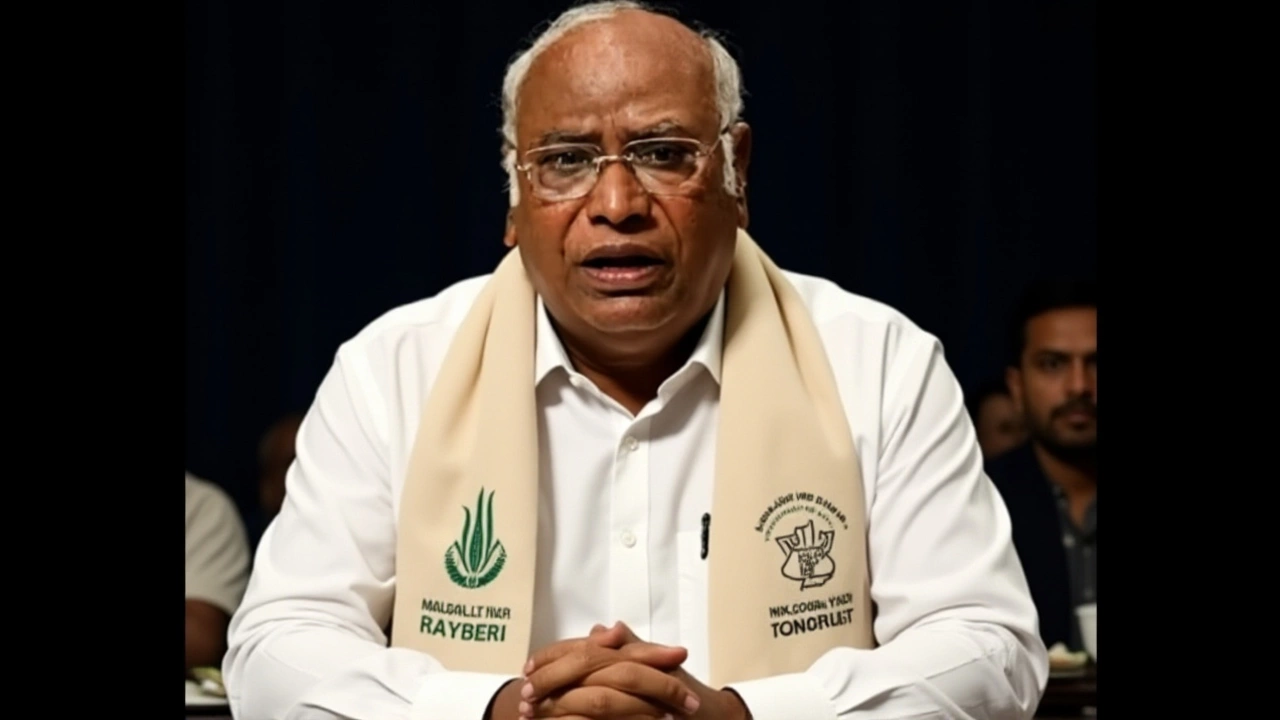When Mallikarjun Kharge, President of the All India Congress Committee was rushed to the intensive‑care unit of MS Ramaiah Hospital in Bangalore on October 1, 2025, the nation’s political press rooms buzzed with a mix of alarm and sympathy. The senior leader, aged 83, experienced a sudden spike in temperature and severe leg pain, prompting his aides to call an ambulance at roughly 07:30 a.m. local time.
Why the sudden turn matters
The AICC has been navigating a turbulent electoral calendar, and Kharge’s health is not just a personal matter—it’s a strategic variable for the party’s upcoming state campaigns. His role as a bridge between veteran leaders and a new generation of Congress politicians means any prolonged absence could shift internal power dynamics.
Chronology of events
- 07:30 a.m., Oct 1 – Kharge complains of high fever and sharp calf pain at his residence in Bengaluru.
- 07:45 a.m. – Party health aides arrange for an emergency transfer to MS Ramaiah Hospital.
- 08:15 a.m. – Doctors begin a battery of tests, including ECG and blood work.
- 09:30 a.m. – A decision is made to implant a temporary pacemaker due to an irregular cardiac rhythm detected during monitoring.
- 10:00 a.m. – Surgery concludes; Kharge is moved to a monitored recovery ward.
By mid‑morning, the party’s official Twitter account released a brief statement confirming the admission and assuring supporters that "the situation is under control."
Family and political reactions
Kharge’s son, Priyank Kharge, who also serves as Karnataka’s Minister for Energy, posted on X at 11:20 a.m.: "My father’s condition is stable and improving. He is under constant observation and receiving the best care." He added a photo of the hospital’s façade, emphasizing transparency.
Across the aisle, Prime Minister Narendra Modi placed a personal call to Kharge, expressing his "best wishes for a swift recovery" and noting that the nation’s health resources were being utilized responsibly.
Senior Congress figures, including former party president Sonia Gandhi, issued brief condolence messages on social media, urging party members to focus on governance while their leader recuperates.
Medical perspective and the pacemaker procedure
Cardiologists at the hospital explained that the pacemaker insertion was a precautionary measure after an episode of atrioventricular block was detected. "In elderly patients with sudden fever, metabolic stress can unmask latent cardiac conduction issues," Dr. R. S. Kumar, chief cardiologist, told reporters. The device implanted is a temporary, battery‑operated unit designed to regulate heartbeats for up to 30 days, after which a permanent solution can be evaluated.
Doctors also highlighted that Kharge’s fever was likely viral, noting a white‑blood‑cell count of 12,300 cells/µL—well above the normal range of 4,000–11,000. Antiviral therapy and supportive care have been administered.
Impact on the Congress party’s strategy
With state elections looming in Karnataka, Madhya Pradesh, and West Bengal, the Congress has been relying on Kharge’s seasoned political judgment to fine‑tune campaign narratives. Analysts from the Indian Institute of Political Studies suggest that his temporary removal could amplify factional voices, especially from regional leaders seeking a larger role.
Nevertheless, the party’s internal communications team emphasized continuity: "The AICC’s executive committee has full authority to make decisions during this period, and the party’s day‑to‑day functioning will not be disrupted," a spokesperson said.
Historical context: Kharge’s journey
Born in 1942 in Gadag, Karnataka, Kharge rose from a grassroots activist to a three‑time Member of Parliament, former Union Minister for Railways, and a stalwart of the Congress’s Dalit leadership. He became AICC president in October 2022, succeeding Sonia Gandhi amid a wave of calls for generational change. His tenure has been marked by attempts to modernize party infrastructure, including the launch of digital outreach platforms ahead of the 2024 general elections.
His health episode recalls the 2014 hospitalization of former Prime Minister Manmohan Singh, which also sparked nationwide concern but ultimately had minimal impact on party operations.
What’s next?
Kharge is expected to remain under observation for at least 48 hours. If his vitals stay stable, doctors will likely discharge him with a follow‑up schedule for pacemaker assessment. The party has indicated that a senior aide will brief members on any policy decisions pending his input.
Meanwhile, the opposition is watching closely. The Bharatiya Janata Party’s Karnataka unit has issued a neutral statement, wishing “a speedy recovery” while reminding the public of the Congress’s “ongoing challenges.”
Key facts
- Patient: Mallikarjun Kharge, 83, AICC President.
- Location: Bangalore, at MS Ramaiah Hospital.
- Date of admission: 1 October 2025.
- Medical interventions: Fever management, blood‑work, temporary pacemaker surgery.
- Family update: Son Priyank Kharge reports condition is "stable and improving."
Frequently Asked Questions
How does Kharge’s hospitalization affect the Congress party’s election strategy?
With Kharge sidelined for a few days, the party’s executive committee will temporarily assume his decision‑making duties. While day‑to‑day campaign activities will continue, senior regional leaders may gain more influence over messaging and candidate selections until he returns.
What medical condition required a pacemaker for Kharge?
Doctors detected an atrioventricular block—a disruption in the electrical signals that coordinate heartbeats—triggered by the stress of a high fever. A temporary pacemaker was implanted to maintain a stable heart rhythm while the underlying infection is treated.
Who confirmed the update on Kharge’s health?
Priyank Kharge, the senior leader’s son and Karnataka’s Energy Minister, posted an X update on October 2, stating that his father’s condition is stable and he is responding well to treatment.
Did Prime Minister Narendra Modi personally reach out?
Yes. According to a statement from the Prime Minister’s Office, Narendra Modi placed a phone call to Kharge on the day of admission, wishing him a swift recovery and expressing concern for his wellbeing.
What are the next steps for Kharge’s medical care?
He will stay under observation for at least 48 hours. If his vitals remain steady, doctors plan to discharge him with a follow‑up schedule to assess the need for a permanent pacemaker, while continuing antiviral therapy for the fever.
